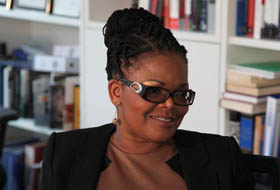Zimbabwe crisis deepens
Pat Sidley, IBA Southern Africa CorrespondentWednesday 7 October 2020

There was widespread hope when the Mugabe regime ended. But, under Emmerson Mnangagwa, the rule of law challenges appear as severe as ever.
At the end of September, Zimbabwe held hearings to appoint judges to its Constitutional Court and the Supreme Court. This could be the last time the system of appointments involving the Judicial Services Commission is seen. It is highly likely several important judicial appointments will be made by President Emmerson Mnangagwa, without the checks and balances built into the 2013 Constitution, thus presenting a serious challenge to the independence of the judiciary.
A second amendment to that Constitution has passed through various stages and now awaits finalisation. Only public comments on the changes appear to have expressed reservations and it now awaits the President’s signature to become law and change the Constitution.
Though broadcast live, the selection of judges has effectively been eclipsed by Zimbabwe’s broader crisis. The President has denied a crisis exists, despite inflation rates almost as high as Venezuela’s (at over 700 per cent) and strikes by various sectors of the workforce, as wages no longer meet basic living needs. Voices of opposition are dealt with brutally, notably lawyers defending victims of human rights abuses. These victims have frequently been journalists focusing on corruption involving senior government officials and their families. All human rights defenders experience delays in bail hearings and a significant amount of physical abuse.
Infamously, one journalist, Hopewell Chin’ono, was held for six weeks without bail. His lawyer, Beatrice Mtetwa, was barred by the magistrate from representing him. Mtetwa was also reported to the Law Society of Zimbabwe, with a suggestion that her membership, and therefore ability to practice law, be terminated. Mtetwa has, she says, challenged the barring and the same magistrate has not stopped her appearing in court before him. She believes the loud opposition to his behaviour in Zimbabwe, and abroad, has made the magistrate ‘see the error of his ways’. Her challenge, however, remains to be heard.
Voices of opposition are dealt with brutally, notably lawyers defending victims of human rights abuses
Mtetwa says the Bill before Parliament – on how the Chief Justice and others are appointed – will ensure that the President appoints crucial posts like the Chief Justice, Attorney General and the Judge President himself. She says that while appointments should be made on merit, this is not always the case, citing the appointment of the Prosecutor General who was seventh on the list after interviews – but was appointed nonetheless. ‘If you have the highest scores, you should be appointed,’ she says.
Mtetwa is not alone in feeling that the police and military are targeting opposition to human rights abuses. Derek Matyszak, a legal and political analyst, believes this is a clampdown that will continue to gather force ahead of the proposed general election in 2023. Many people are being hauled before the courts who should not be, he says. This includes human rights defenders and anybody expressing discontent. He is critical of the Law Society, which he says is now ‘very ZANU-PF’ (the ruling party in power in Zimbabwe).

Human rights lawyer Beatrice Mtetwa
Blessing Gorejena heads up a coalition of Zimbabwean Human Rights NGOs. She believes that the independence of the judiciary is seriously threatened, and cites another clause in the Bill before Parliament, which sees the termination of judges’ appointments when they are 70 years old. It also allows for an extension of five years under certain circumstances. She says there is an effect on judges as they near 70 years old – to ensure their judgments are not seen as controversial for fear of not being able to work past that age.
Gorejena says the public perception is that the courts have been ‘captured’ by political elites and the government. In her own experience the courts have not protected people. There has been a ‘blatant violation of human rights’. She notes that magistrates have also failed to safeguard human rights. There is sufficient evidence that the judiciary is not independent.
South Africa, with 42 per cent unemployment and frequent outbursts of xenophobia often exercised against Zimbabweans, has been called on to help Zimbabwe’s crisis and consequently plays reluctant host to hundreds of thousands of refugees.
Two attempts by South Africa to mediate have failed. The country’s defence minister even had her salary docked for three months by President Cyril Ramaphosa, as punishment for taking a Defence Force jet with several members of the ruling African National Congress. The trip was supposed to include seeing the Zimbabwean opposition party, the MDC, as well as human rights NGOs. Neither took place. Mnangagwa dismissed the trip saying the crisis was ‘in the heads’ of South Africans. There was no crisis in Zimbabwe.
However, South African media has covered several strikes and witnessed human rights abuses. The country’s potential for mediation is seen by some as necessary to assist Zimbabwe. The bloc of countries surrounding Zimbabwe, known as the Southern African Development Community (SADC), was seen to bolster Mugabe’s tenure as president during his regime. Since the effective military coup by President Mnangagwa, and subsequent elections, South Africa’s potential role could be to assist Zimbabwe and eventually bring about some pressure from the SADC countries and the African Union. Evidence of this is South Africa’s willingness to intervene – although, so far, not successfully.
Pat Sidley is a freelance journalist and can be contacted at pattykate@icon.co.za
Header pic: A policewoman turns people away from the city centre ahead of an anti-government protest during the Covid-19 outbreak in Harare, Zimbabwe, 30 July 2020. REUTERS/Philimon Bulawayo
